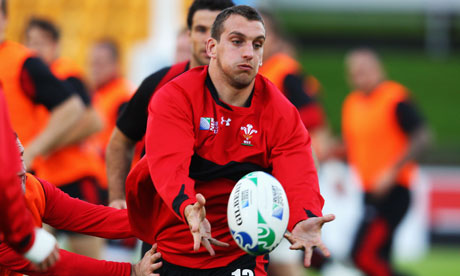
TURNING CHEATING ON ITS HEAD
The International Rugby Board is not, contrary to reports, considering bringing a case against Warren Gatland for revealing on Tuesday that he had floated the idea of resorting to uncontested scrums after what the Wales coach felt was an unjust red card in the semi-final against France.
Sam Warburton, the Wales captain, was ordered off 17 minutes in for a tip tackle. Wales had already lost their tighthead prop Adam Jones with a calf injury and they were shoved backwards at the first scrum when they were a man short.
A few voices in the media room questioned immediately whether Wales would order a prop to fake an injury and force scrums to be uncontested, avoiding the need for the centre Jamie Roberts to add his weight when Wales had the put-in.
It would have been cheating but Gatland felt cheated by the decision of the referee Alain Rolland to show Warburton the red card after the flanker dropped Vincent Clerc to the ground head first. The coach's contention was that the occasion, a World Cup semi-final, and a lack of intent merited discretion.
A place in the World Cup final was on the line for Wales. The same applied to Rolland. The IRB had reiterated its directive on tip tackling, which does not distinguish between a player driving an opponent into the ground or dropping him, after Steve Walsh showed a yellow card to two players who made dangerous tackles during Tonga's victory over France. They were both given bans after being cited.
Had Rolland not sent off Warburton, any chance of his refereeing the final would have gone. If Gatland, or any coach, gives a directive to a player, such as telling his fly-half to kick the ball inside his own half from every set piece in the opening 20 minutes, and the player then gives away a try by attempting the outrageous near his own line, would he be picked for the next game?
Would there have been such widespread sympathy had it been a player with a chequered past, such as Andy Powell, rather than Warburton, who had been held up as an exemplar in the run-up to the semi-final, who had dropped Clerc? Would the reaction, in Wales and France, have been the same had Julien Bonnaire let go of Shane Williams in mid-air?
Rolland acted without emotion, as he is paid to do. Had he shown a yellow card and it turned out Clerc had suffered a serious neck injury, would he have ever refereed at the highest level again? The IRB puts the safety of players above the intent of a tackler and that is where its responsibility should lie.
Warburton was pumped up from the start against France, as you would expect given that it was one of the most significant matches in Wales's history; unlike the 1987 semi-final against New Zealand, they had more than an indistinctly faint chance of winning. His face was a study in aggression from the moment Rolland blew for the kick-off and he hit every breakdown with thunderous intent.
It was an adrenaline rush, but it had not really subsided by the 18th minute when Clerc came his way, as if he had had one double espresso too many. He would barely have felt any impact on tackling the Frenchman, like Popeye tossing rival suitors for Olive Oyl to one side.
It contrasted with Richie McCaw's demeanour the following day, another openside flanker and another captain. His eyeballs were bursting when he ran out against Australia, whose breakaway David Pocock had, in the eyes of many, taken over McCaw as the master of the breakdown.
McCaw hit hard from the first tackle and, while his fury was sustained, his aggression was controlled. He was a player with 100+ caps to Warburton's 20+ and his experience told. Much has been made here of Wales's youthful vigour, but did they have quite enough knowhow?
Warburton will return the wiser. It was not a malicious challenge and his leadership of Wales on and off the field has helped a team that had gained a reputation for being easily distracted into one whose focus was sharp. If Wales are to become a consistent force again, Warburton will be at the core of the revival.
As for Gatland's revelation that he had considered cheating, the international game is lagging behind the club version in having only seven replacements on the bench, rather than eight. Sides do not have an obligation to name an entire front row in reserve.
Would Wales have been investigated had Adam Jones's replacement, Paul James, hobbled off not long after Warburton's departure? Probably not given past precedent.
When the Lions mounted their comeback in the first Test against South Africa in Durban in 2009, the Springboks had taken off their captain, John Smit, thinking the game was won. As their comfort turned to unease, Smit started pacing the touchline in frustration.
He soon found himself back on the field when Deon Carstens suddenly found something wrong with his shoulder. Smit steadied South Africa in the final minutes and Carstens was fit for the following week. No one investigated.
Perhaps Gatland's point is that while certain laws and directives are adhered to, such as those governing dangerous tackles, others, such as the one that says a front-row who has been substituted may only return to the field if another front-rower is injured, are not policed, making cheating more than probably pay.

